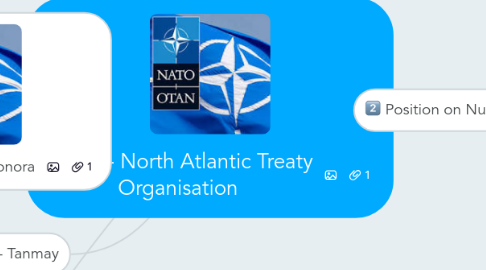
1. Who are you we? - Eleonora
1.1. NATO'S essential purpose is to protect the freedom and security of our members through political and military means.
1.2. 26 member states in total, 27 in Europe + 2 in North America
1.3. Promotes democratic values and encourages cooperation on defence and security issues to prevent conflicts.
1.4. Sworn to stand together against aggression and an attack against one would be an attack against all
1.5. It is committed to resolve disputes in a peaceful matter. If diplomatic efforts don't work they have the capability to undertake crisis-management operations.
1.6. The NATO treaty was signed on April 4th 1949
1.7. Their main goal is to prevent conflicts in a peaceful matter
2. Evidence of our views - Marisa
2.1. NATO is committed to arms control, disarmament and non-proliferation, but as long as nuclear weapons exist, it will remain a nuclear alliance.
2.2. The 2010 Strategic Concept
2.2.1. A goal of creating conditions for a world without nuclear weapons but as long as nuclear weapons remain so will NATO
2.3. The 2012 Deterrence and Defence Posture Review
2.3.1. Set to work on a Deterrence and Defence Posture Review (DDPR)
3. Impact of your views - Tanmay
3.1. Pros
3.1.1. Prevents world annihilation and radioactive pollution -- Chernobyl
3.1.2. Encourages cooperation between countries
3.2. Cons
3.2.1. Weakens global economy -- bank investment
3.2.2. Loss of jobs
3.2.3. Loss of deterrent
3.2.4. Loss of power
4. Position on Nuclear Weapons - Reem
4.1. Nuclear sharing is a policy of nuclear deterrence - this involves countries without nuclear weapons to use nuclear weapons by NATO. The Nuclear deterrence was first mentioned during the cold war when the United States and the Soviet Union both made a stockpile of nuclear weapons.
4.1.1. The Soviet Union then had a view that if a nuclear war was to take place it would be fought and won. The United states then adopted the nuclear deterrence, from a threat of retaliation or from any sort of enemy attack.
4.2. Nuclear weapons are a main component for NATO's general attempt to stop and defend with the missile defence forces.
4.2.1. NATO is part of an arms control, disarmament and non-profiliation, but since nuclear weapons exists and continue to exist, then NATO will remain a nuclear alliance.
4.3. Three Nuclear Powers - France, The United Kingdom, United States - The united states is the better known for providing the weapons for the nuclear sharing.
4.3.1. Nuclear weapons which are in non nuclear weapons are well guarded by the United states air force for better security.
4.4. Countries who are part of the nuclear sharing must have consultation and have common decisions on nuclear weapons policy, they must also keep their nuclear weapons within their territory, in the case of an occurring war.
4.4.1. The Non-Proliferation Treaty does not control or have anything to do with the actions of NATO and their nuclear weapon choices. (The united states informed NATO allies that the Non-proliferation treaty would not be controlling any longer in case of a war)
4.5. NATO's trainers built an Afghan army, (professional force). 350,000 sodgiers. Responsible for Afghanistan's security. ISIS - NATO is training Iraqi officers in Jordan, against ISIS terroriste in Iraq
4.5.1. Small/medium sized nations, and help them contribute to against terror. More than 50 countries fought against terrorist groups. NATO has been fighting terrorism for many years , ever since the terrorist attacks from 9/11

